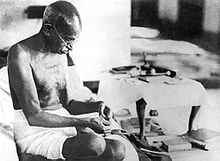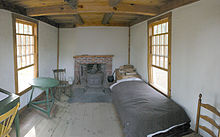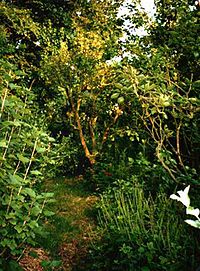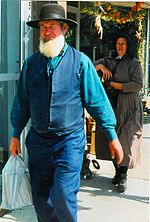- Simple living
-
 Mohandas Gandhi spinning yarn in 1942. Gandhi believed in a life of simplicity and self-sufficiency.
Mohandas Gandhi spinning yarn in 1942. Gandhi believed in a life of simplicity and self-sufficiency.
Simple living encompasses a number of different voluntary practices to simplify one's lifestyle. These may include reducing one's possessions or increasing self-sufficiency, for example. Simple living may be characterized by individuals being satisfied with what they need rather than want.[1][2] Although asceticism generally promotes living simply and refraining from luxury and indulgence, not all proponents of simple living are ascetics.[3] Simple living is distinct from those living in forced poverty, as it is a voluntary lifestyle choice.
Adherents may choose simple living for a variety of personal reasons, such as spirituality, health, increase in 'quality time' for family and friends, personal taste, frugality, or reducing personal ecological footprint and stress. Simple living can also be a reaction to materialism and conspicuous consumption. Others cite socio-political goals aligned with the anti-consumerist movement, including conservation, degrowth, social justice, ethnic diversity and sustainable development.
Contents
History
Religious and spiritual
The recorded history of voluntary simplicity, often associated with asceticism, begins with the Shramana traditions of Iron Age India. Buddha and biblical Nazarites (notably John the Baptist) were early ascetics. Various notable individuals have claimed that spiritual inspiration led them to a simple living lifestyle, such as Francis of Assisi, Ammon Hennacy, Leo Tolstoy, Rabindranath Tagore, Albert Schweitzer, and Mohandas Gandhi.[4][5]
Simple living has traditions that stretch back to the Orient, resonating with leaders such as Zarathustra, Buddha, Laozi, and Confucius and was heavily stressed in both Greco-Roman culture and Judeo-Christian ethics.[5] Diogenes of Sinope was a Greek cynic who advocated extreme voluntary poverty and purportedly lived in a barrel in the agora.
Epicureanism, based on the teachings of the Athens-based philosopher Epicurus, flourished from about the fourth century BC to the third century AD. Epicureanism upheld the untroubled life as the paradigm of happiness, made possible by carefully considered choices. Specifically, Epicurus pointed out that troubles entailed by maintaining an extravagant lifestyle tend to outweigh the pleasure of partaking in it. He therefore concluded that what is necessary for happiness, bodily comfort, and life itself should be maintained at minimal cost, while all things beyond what is necessary for these should either be tempered by moderation or completely avoided.[6]
Plain people are Christian groups who have for centuries practiced lifestyles in which some forms of wealth or technology are excluded for religious or philosophical reasons. Groups include the Shakers, Mennonites, Amish, Harmony Society, and some Quakers. There is a Quaker belief called Testimony of Simplicity that a person ought to live her or his life simply.
Jean-Jacques Rousseau strongly praised the simple life in many of his writings, especially in his Discourse on the Arts and Sciences (1750) and Discourse on Inequality (1754).[7]
Secular
 Henry David Thoreau's cabin on the shores of Walden Pond.
Henry David Thoreau's cabin on the shores of Walden Pond.
Henry David Thoreau, a North American naturalist and author, is often considered to have made the classic secular statement advocating a life of simple and sustainable living in his book Walden (1854). Thoreau conducted a two year experiment living a plain and simple life on the shores of Walden Pond.
In Victorian Britain, Henry Stephens Salt, an admirer of Thoreau, popularised the idea of "Simplification, the saner method of living".[8] Other British advocates of the simple life included Edward Carpenter, William Morris, and the members of "The Fellowship of the New Life".[9] C.R. Ashbee and his followers also practiced some of these ideas, thus linking simplicity with the Arts and Crafts Movement.[10] British novelist John Cowper Powys advocated the simple life in his 1933 book A Philosophy of Solitude.[11] John Middleton Murry and Max Plowman practised a simple lifestyle at their Aldephi Centre in Essex in the 1930s.[12] Irish poet Patrick Kavanagh championed a "right simplicity" philosophy based on ruralism in some of his work.[13]
George Lorenzo Noyes, a naturalist, mineralogist, development critic, writer, and artist, is known as the Thoreau of Maine. He lived a wilderness lifestyle, advocating through his creative work a simple life and reverence for nature. During the 1920s and 1930s, the Vanderbilt Agrarians of the Southern United States advocated a lifestyle and culture centered upon traditional and sustainable agrarian values as opposed to the progressive urban industrialism which dominated the Western world at that time.
Thorstein Veblen warned against the conspicuous consumption of the materialistic society with The Theory of the Leisure Class (1899); Richard Gregg coined the term "voluntary simplicity" in The Value of Voluntary Simplicity (1936). From the 1920s, a number of modern authors articulated both the theory and practice of living simply, among them Gandhian Richard Gregg, economists Ralph Borsodi and Scott Nearing, anthropologist-poet Gary Snyder, and utopian fiction writer Ernest Callenbach. E. F. Schumacher argued against the notion that "bigger is better" in Small Is Beautiful (1973); and Duane Elgin continued the promotion of the simple life in Voluntary simplicity (1981).
Practices
Reducing expenditure, income and possessions
Some people practice simple living by reducing expenditure on goods or services. By reducing expenditure, it is possible to reduce income and the time spent earning money. The time saved may be used to help family or others. For example during the Christmas and holiday season, some people often perform alternative giving. Others may spend the extra free time to improve their quality of life, for example pursuing creative activities such as art and crafts (see starving artist).
Another approach is to focus more fundamentally on the underlying motivation of buying and consuming so many resources for a good quality of life.[citation needed] Though our society often seeks to buy happiness, materialism very frequently fails to satisfy, and may even increase the level of stress in life. It has been said that "the making of money and the accumulation of things should not smother the purity of the soul, the life of the mind, the cohesion of the family, or the good of the society."[14] There are eco-anarchist groups in the United States and Canada today promoting lifestyles of simplicity. Simple living can entail only consuming the resources needed to sustain life.
The grassroots awareness campaign, National Downshifting Week (UK)[15] (founded 1995) encourages participants to positively embrace living with less. Campaign creator, British writer and broadcaster on downshifting and sustainable living, Tracey Smith says, "The more money you spend, the more time you have to be out there earning it and the less time you have to spend with the ones you love". National Downshifting Week encourages participants to 'Slow Down and Green Up' and contains a list of suggestions for individuals, companies, children and schools to help adopt green or eco-friendly policies and habits, develop corporate social and environmental responsibility in the workplace, and create eco-protocols and lessons that work alongside the national curriculum, respectively.
Reducing possessions can also form part of simple living. The 100 Thing Challenge is a grassroots movement to whittle down possessions to a mere 100 items, with the aim of decluttering and simplifying people's lives.[16]
Increasing self-sufficiency
 Robert Hart's forest garden in Shropshire, England.
Robert Hart's forest garden in Shropshire, England.
One way to simplify life is to get back-to-the-land and grow your own food, as increased self-sufficiency reduces dependency on money and the economy. Forest gardening, developed by simple living adherent Robert Hart, is a low-maintenance food production system based on woodland ecosystems, incorporating fruit and nut trees, shrubs, herbs, vines and perennial vegetables.[17] Hart created a model forest garden from a 0.12 acre (500 m²) orchard on his farm at Wenlock Edge in Shropshire.[18]
The idea of food miles, the number of miles a given item of food or its ingredients has travelled between the farm and the table, is used by simple living advocates to argue for locally grown food. This is now gaining mainstream acceptance, as shown by the popularity of books such as The 100-Mile Diet, and Barbara Kingsolver's Animal, Vegetable, Miracle: A Year of Food Life. In each of these cases, the authors devoted a year to reducing their carbon footprint by eating locally.[19]
City dwellers can also produce fresh home grown fruit and vegetables in pot gardens or miniature indoor greenhouses. Tomatoes, lettuce, spinach, Swiss chard, peas, strawberries, and several types of herbs can all thrive in pots. Radical Simplicity also says that a person "could sprout seeds. They are tasty, incredibly nutritious, and easy to grow... We grow them in wide mouthed mason jars with a square of nylon window screen screwed under a metal ring".[20] One argument against gardening at home is how often people begin a garden and later stop it. Farmer Matt Moore spoke on this issue: "How does it affect the consumer to know that broccoli takes 105 days to grow a head?," [...] "The supermarket mode is one of plenty — it's always stocked. And that changes our sense of time. How long it takes to grow food — that's removed in the marketplace. They don't want you to think about how long it takes to grow, because they want you to buy right now".[21] One way to change this viewpoint is also suggested by Mr. Moore. He placed a video installation in the produce section of a grocery store that documented the length of time it took to grow certain vegetables.[21] This raises awareness in people of the length of time actually needed for gardens and could easily be combined with online lectures to help new gardeners.
The do it yourself ethic refers to the principle of undertaking necessary tasks oneself rather than having others, who are more skilled or experienced, complete them for you.
Reconsidering technology
Although simple living is often a secular pursuit, it may still involve reconsidering personal definitions of appropriate technology, as Anabaptist groups such as the Amish or Mennonites have done. People who eschew modern technology are often referred to as Luddites or Neo-Luddism adherents.[22]
People who practice simple living have diverse views on the role of technology. Some simple living adherents, such as Kirkpatrick Sale, are strong critics of modern technology,[22] while others see the Internet as a key component of simple living in the future, including the reduction of an individual's carbon footprint through telecommuting and less reliance on paper. Simple living may include high-tech components—indeed computers, Internet, photovoltaic arrays, wind and water turbines, and a variety of other cutting-edge technologies can be used to make a simple lifestyle within mainstream culture easier and more sustainable.
Advertising is criticised for encouraging a consumerist mentality. Many advocates of simple living tend to agree that cutting out, or cutting down on, television viewing is a key ingredient in simple living. Some see the Internet, podcasting, community radio or pirate radio as viable alternatives.[citation needed]
Simplifying diet
Another practice is the adoption of a simplified diet. Diets that may simplify domestic food production and consumption include vegan diets and the Gandhi diet. In the United Kingdom, the Movement for Compassionate Living was formed by Kathleen and Jack Jannaway in 1984, to spread the vegan message and promote simple living and self-reliance as a remedy against the exploitation of humans, animals, and the Earth.
Politics
Many Green Parties often advocate simple living as a consequence of their "four pillars" or the "Ten Key Values" of the United States Green Party. This includes, in policy terms, their rejection of genetic modification and nuclear power and other technologies they consider to be hazardous. The Greens' support for simplicity is based on the reduction in natural resource usage and environmental impact. This concept is expressed in Ernest Callenbach's "green triangle" of ecology, frugality and health.
Many with similar views avoid involvement even with green politics as compromising simplicity, however, and advocate forms of green anarchism that attempt to implement these principles at a smaller scale, e.g. the ecovillage.
The alleged relationship between economic growth and war, when fought for control and exploitation of natural and human resources, is considered a good reason for promoting a simple living lifestyle. Avoiding the perpetuation of the resource curse is a similar objective of many simple living adherents. Opposition to war has led some to a form of tax resistance in which they reduce their tax liability by taking up a simple living lifestyle.[23][24]
Economics
A new economics movement has been building since the UN conference on the environment in 1972,[25] and the publication that year of Only One Earth, The Limits to Growth, and Blueprint For Survival, followed in 1973 by Small Is Beautiful: Economics As If People Mattered.[26]
Recently, David Wann has introduced the idea of “simple prosperity” as it applies to a sustainable lifestyle. From his point of view, and as a point of departure for what he calls real sustainability, “it is important to ask ourselves three fundamental questions: what is the point of all our commuting and consuming? What is the economy for? And, finally, why do we seem to be unhappier now than when we began our initial pursuit for rich abundance?”[27] In this context, simple living is the opposite of our modern quest for affluence and, as a result, it becomes less preoccupied with quantity and more concerned about the preservation of cities, traditions and nature.
A reference point for this new economics can be found in James Robertson's A New Economics of Sustainable Development,[26] and the work of thinkers and activists, who participate in his Working for a Sane Alternative network and program. According to Robertson, the shift to sustainability is likely to require a widespread shift of emphasis from raising incomes to reducing costs.
The principles of the new economics, as set out by Robertson, are the following:
- systematic empowerment of people (as opposed to making and keeping them dependent), as the basis for people-centred development
- systematic conservation of resources and the environment, as the basis for environmentally sustainable development
- evolution from a “wealth of nations” model of economic life to a one-world model, and from today's inter-national economy to an ecologically sustainable, decentralising, multi-level one-world economic system
- restoration of political and ethical factors to a central place in economic life and thought
- respect for qualitative values, not just quantitative values
See also
- Affluenza
- Anti-consumerism
- Car-free movement
- Christian views on poverty and wealth
- Conspicuous consumption
- Corporate poverty
- Downshifting
- Financial independence
- Freeganism
- Frugality
- Intentional community
- Intentional living
- Mottainai
- Otium
- Over-consumption
- Planned obsolescence
- Refusal of work
- Slow Movement
- Slow living
- Thrifting
- Walden
- Wwoofing
Notes and references
- ^ Linda Breen Pierce (2000). Choosing Simplicity. ISBN 9780967206714. http://books.google.co.uk/books?id=dF1y9zdTpegC&pg=PA304#v=onepage&q&f=false. "Rather than being consumed by materialism, we choose to surround ourselves with only those material possessions we truly need or genuinely cherish"
- ^ Vernon Howard. Quotes about Happiness. http://books.google.co.uk/books?id=AKHxP8xncfcC&lpg=PT24&dq=%22You%20have%20succeeded%20in%20life%20when%20all%20you%20really%20want%20is%20only%20what%20you%20really%20need%22&pg=PT24#v=onepage&q&f=false. "You have succeeded in life when all you really want is only what you really need"
- ^ Griffiths, Michael. B., Flemming Christiansen, and Malcolm Chapman. (2010) 'Chinese Consumers: The Romantic Reappraisal’. Ethnography, Sept 2010, 11, 331–57.
- ^ Slocock, N. (May 2004). "'Living a Life of Simplicity?' A Response to Francis of Assisi by Adrian House".
- ^ a b Shi, David. The Simple Life. University of Georgia Press (2001).
- ^ Smith, M.F. (2001). Lucretius: On the Nature of Things. Introduction available online at Epicurius.info. Hackett Pub Co ISBN 978-0-87220-587-1
- ^ Marshall, Peter. Nature's Web: Rethinking Our Place on Earth. M.E. Sharpe, 1996 (pp. 235; 239–44).
- ^ Salt quoted in Peter C. Gould, Early Green Politics, p. 22.
- ^ Gould, pp. 27–8
- ^ Fiona Maccarthy, The Simple Life: C.R. Ashbee in the Cotswolds (London, 1981).
- ^ A Philosophy of Solitude, London, 1933. See also David Goodway, Anarchist Seeds Beneath the Snow (Liverpool, 2006), pgs. 48–9, 174, for Goodway's comparison of Powys' ideas of the Simple Life to Carpenter's.
- ^ Hardy, Dennis. Utopian England: Community Experiments 1900–1945 p. 42. Hardy's book details other simple living movements in the UK in this period.
- ^ "Kavanagh's Lessons for Simple Living". Irish Times. November 23, 2009. http://www.irishtimes.com/newspaper/features/2009/1123/1224259295510.html.
- ^ David Shi, quoted in Elgin, Duane, Voluntary Simplicity, (1993) p. 53.
- ^ National Downshifting Week official website
- ^ Lisa McClaughlin (June 5, 2008). "How to Live with Just 100 Things". Time. http://www.time.com/time/magazine/article/0,9171,1812048,00.html.
- ^ Robert Hart. Forest gardening: Cultivating an edible landscape. p. 97. http://books.google.co.uk/books?id=N01940btQAQC&lpg=PA97&dq=forest%20gardening%20robert%20hart%20simple%20living&pg=PA97#v=onepage&q&f=false.
- ^ Robert Hart (1996). Forest Gardening. p. 45. http://books.google.co.uk/books?id=N01940btQAQC&lpg=PA97&dq=forest%20gardening%20robert%20hart%20simple%20living&pg=PA45#v=onepage&q&f=false.
- ^ Taylor, K. (August 8, 2007). "The Year I Saved The World." New York: The Sun."
- ^ Merkel, Jim. Radical Simplicity. British Columbia: New Society, 2003. Print, 170–71.
- ^ a b Mark, Jason. "How Does Your Garden Grow? Watch and See" food.change.org. Sustainable Food. 26 Feb 2010. Web.
- ^ a b Sale, K. (February 1997). "America's New Luddites." Le Monde diplomatique.
- ^ "Low Income/Simple Living as War Tax Resistance". NWTRCC. http://www.nwtrcc.org/practical5.php.
- ^ Picket Line Annual Report
- ^ United Nations Environment Program (1972) Report of the United Nations Conference on the Human Environment. Stockholm 1972. Retrieved on March 24, 2008
- ^ a b Robertson, James (2005) "The New Economics of Sustainable Development". A Briefing for Policy Makers. Report for the European Commission. ISBN 0 7494 3093 1
- ^ Wann, David. Simple Prosperity: Finding Real Wealth in a Sustainable Lifestyle. New York, St. Martin's Griffin, 2007. ISBN 978-0-312-36141-9
Further reading
- Scott and Helen Nearing (1970) The Good Life: Helen and Scott Nearing's Sixty Years of Self-Sufficient Living, Schocken
- Vernard Eller (1973) The Simple Life, ISBN 0-8028-1537-5
- Dolly Freed (1978) Possum Living: How to Live Well Without a Job and with (Almost) No Money 2010 edition ISBN 0-9820539-3-2
- Charles Long (1986) How to Survive Without a Salary: Living the Conserver Lifestyle. 1996 edition ISBN 1-894622-37-5
- Wendell Berry (1990) What Are People For?, North Point Press, ISBN 0-86547-437-0
- Joe Dominguez and Vicki Robin (1992) Your Money or Your Life, Viking.
- Vicki Robin with Monique Tilford and and contributor Mark Zaifman Your Money or Your Life: Revised and Updated for the 21st Century, published by Penguin Books in December 2008.
- Edward Romney (1992) Living Well on Practically Nothing 2001 edition ISBN 1-58160-282-0
- Janet Luhrs (1997) The Simple Living Guide: A Sourcebook for Less Stressful, More Joyful Living, ISBN 0-553-06796-6
- Amy Dacyzyn (1998) The Complete Tightwad Gazette: Promoting Thrift as a Viable Alternative Lifestyle., ISBN 0-375-75225-0
- John de Graaf, David Wann and Thomas H. Naylor (2002) Affluenza, ISBN 1-57675-199-6
External links
Simple living Practices Movements Books Related topics Tax resistance Topics Conscientious objection to military taxation · History of tax resistance · List of tax resisters · Tax noncompliance · Tax revoltMethods Simple living · Tax avoidance · Tax evasionOrganizations Addiopizzo · Aide-toi, le ciel t'aidera · All Britain Anti-Poll Tax Federation · Anti-Poll Tax Unions · Association of Real Estate Taxpayers · Committee for Non-Violent Action · Irish National Land League · National Campaign for a Peace Tax Fund · National War Tax Resistance Coordinating Committee · Northern California War Tax Resistance · Pagal Panthis · Peacemakers · Women's Tax Resistance LeagueMedia An Act of Conscience · Civil Disobedience · Clericis laicos · The Cold War and the Income Tax: A Protest · Vyborg ManifestoCampaigns 1300s1500sRappenkrieg1600sRevolt of the va-nu-pieds · Revolt of the papier timbré1700s1800s1900sRelated topics Categories:- Simple living
- Subcultures
Wikimedia Foundation. 2010.

